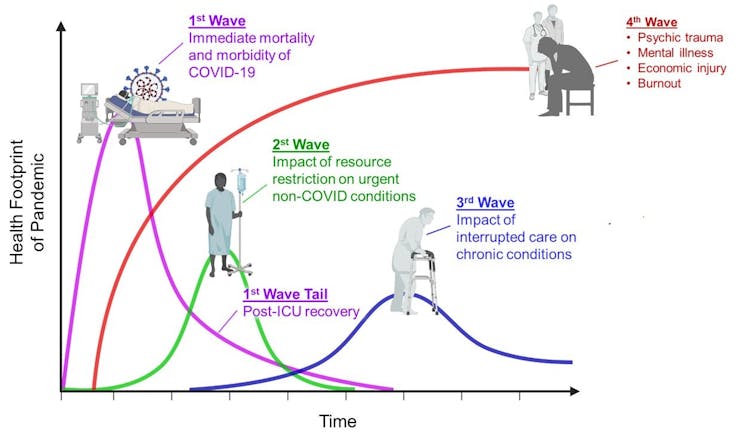
Emily Jenkins receives funding for other #mentalhealth studies from the Canadian Institutes of Health Research, Public Health Agency of Canada, Michael Smith Foundation for Health Research and Community Action Initiative.
anne.gadermann@ubc.ca has received funding for other #mentalhealth related research from the Canadian Institutes of Health Research, Michael Smith Foundation for Health Research, and Social Sciences and Humanities Research Council.
Corey McAuliffe does not work for, consult, own shares in or receive funding from any company or organization that would benefit from this article, and has disclosed no relevant affiliations beyond their academic appointment.
The #mentalhealth consequences of #COVID-19 can be described as the “fourth wave” of the #pandemic, and are projected to result in the greatest and most enduring health footprint.
Canadian data show growing #mentalhealth concerns across the country. In April 2020, the Angus Reid Institute found that 50 per cent of Canadians felt their #mentalhealth had worsened during the #pandemic, indicating high levels of worry and #anxiety. The following month, Statistics Canada reported only 54 per cent of Canadians identified their #mentalhealth as “very good” or “excellent” in 2020, compared to 68 per cent two years earlier.

As #mentalhealth researchers working in collaboration with groups who have long experienced health and social inequities, we know that general population data do not tell the whole story. The toll of the #pandemic is not distributed equally.
#JamesDonaldson notes:
Welcome to the “next chapter” of my life… being a voice and an advocate for #mentalhealthawarenessandsuicideprevention, especially pertaining to our younger generation of students and student-athletes.
Getting men to speak up and reach out for help and assistance is one of my passions. Us men need to not suffer in silence or drown our sorrows in alcohol, hang out at bars and strip joints, or get involved with drug use.
Having gone through a recent bout of #depression and #suicidalthoughts myself, I realize now, that I can make a huge difference in the lives of so many by sharing my story, and by sharing various resources I come across as I work in this space. #http://bit.ly/JamesMentalHealthArticle
Root causes and differential #mentalhealth impact
Growing #mentalhealthchallenges amid the #pandemic illustrate how profoundly population-level #mentalhealth is shaped by the social determinants of health — the everyday conditions in which we live. Increases in #mentalhealthchallenges have been attributed to months of physical distancing, growing job loss, economic uncertainty, housing and food insecurity and child care or school closures. Many of us are attempting to balance far too much, and it is taking a toll.
Our research, done in partnership with the Canadian #MentalHealth Association, adds new and concerning nuances to these trends.
During the first phase of the economic reopening in May, we conducted a nationally representative survey of 3,000 adults over 18 years old in Canada. Thirty-eight per cent of the general population reported experiencing a deterioration in #mentalhealth since the onset of the #pandemic. This effect was more pronounced in specific groups: 59 per cent of those with a pre-existing #mentalhealthcondition reported this experience, 48 per cent of those with a disability, and 44 per cent of people living in poverty.
A rise in suicidal thoughts
Our research also shows a significant jump in suicidal thoughts or feelings arising from the #pandemic, with six per cent of the general population reporting this compared to 2.5 per cent in 2016.

Again, the impact is greater on groups marginalized by social circumstances and #stigma, with 18 per cent of those who reported a pre-existing #mentalhealthcondition identifying suicidal thoughts/feelings — nearly one in five people. Sixteen per cent of those who identified as Indigenous reported experiencing suicidal thoughts, as well as 14 per cent of people with a disability and 14 per cent of those identifying as #LGBTQ+. This sobering finding has been linked to extraordinarily high rates of unemployment and economic instability and aligns with respondents’ greatest sources of #stress: financial concerns, including job insecurity.
Our study further identified food insecurity as a considerable concern and potential challenge to #mentalhealth. Specifically, 18 per cent worried about having enough food for their family. This concern was magnified to affect 37 per cent of those living in poverty, 28 per cent of those with a disability, 26 per cent of racialized people and 25 per cent of Indigenous people. The relationship between food insecurity and #mentalchallenges is well established.
Additionally, our study identified that fear of domestic violence was high, with nine per cent of respondents reporting this concern. This was twice as likely (18 per cent) among racialized people and also high (14 per cent) among Indigenous people. This consequence has been described as a “shadow pandemic,” with implications for persistent adverse #mentalhealth outcomes, particularly for #women.
Equity must be part of the equation
Our research confirms that the toll of the #pandemic is not distributed equally and is among the first to show that those who are systematically oppressed due to their #mentalhealth or disability status, income, ethnicity, sexuality or gender have borne the brunt of the #pandemic’s #mentalhealth consequences. This will continue unless we frame our public health and policy responses towards equity.
We need an overhaul in our approach to #mentalhealth.
When last estimated, costs associated with #mentalhealthchallenges in Canada topped $51 billion annually. As well, our #mentalhealthsystem is insufficient in addressing demand and not equipped to respond to the everyday conditions responsible for many #mentalhealthchallenges, particularly as they relate to the #pandemic.
We need a comprehensive and equity-oriented #mentalhealthstrategy that not only includes prevention and treatment, but also promotion.
#Mentalhealth promotion is a strengths-based approach that emphasizes healthy public policy. Characterized by “explicit concern for health and equity in all areas of policy,” it enhances community and population-level #mentalhealthresponses, especially for those experiencing the greatest risk.
In the case of #COVID-19, this includes poverty reduction strategies, such as universal basic income, to mitigate the effects of job loss and economic hardship to prevent #suicide and further #mentalhealth decline.
Also important are trauma- and violence-informed #mentalhealthsupports, developed in collaboration with communities that will access them. It includes dedicated efforts to safely reopen #schools and childcare centres, delivering programming to support children’s social-emotional development, and often providing safety, food security and #mentalhealthsupports as well as respite for struggling parents.
Now more than ever, public health and #mentalhealthstrategies need to align to address the impact of the #pandemic. An equity-oriented response is the only solution for a sustainable recovery.



